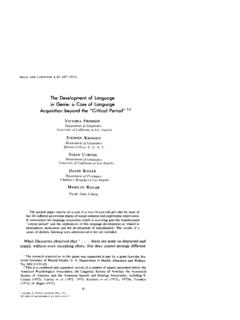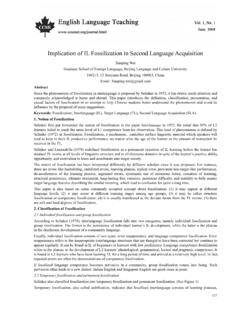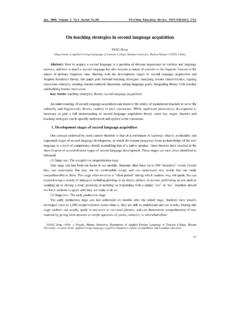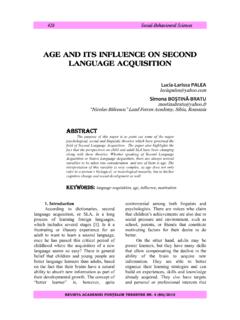Transcription of The Role of Consciousness in Second Language Learning
1 The Role of Consciousness in Second LanguageLearning{RICHARD W. SCHMIDTThe University of Hawaii at ManoaThis paper summarizes recent psychological research and theory on the topicof Consciousness and looks at three questions in Second Language learningrelated to the role of Consciousness in input processing: whether consciousawareness at the level of 'noticing' is necessary for Language Learning (thesubliminal Learning issue); whether it is necessary to consciously 'pay attention'in order to learn (the incidental Learning issue); and whether learner hypothesesbased on input are the result of conscious insight and understanding or anunconscious process of abstraction (the implicit Learning issue). I conclude thatsubliminal Language Learning is impossible, and that noticing is the necessaryand sufficient condition for converting input to intake.}
2 Incidental Learning , onthe other hand, is clearly both possible and effective when the demands of atask focus attention on what is to be learned. Even so, paying attention isprobably facilitative, and may be necessary if adult learners are to acquireredundant grammatical features. The implicit Learning issue is the mostdifficult to resolve. There is evidence for it, as well as for a facilitative effect forconscious understanding, but accounting for implicit Learning may entailabandonment of the notion of unconscious 'rules'of the type usually assumedin applied INTRODUCTIONOne of the more controversial issues in applied linguistics concerns the role ofconscious and unconscious processes in Second Language Learning . On the onehand, there are many who believe that conscious understanding of the targetlanguage system is necessary if learners are to produce correct forms and usethem appropriately.
3 In this view, errors are the result of not knowing the rules ofthe target Language , forgetting them, or not paying attention. There is littletheoretical support for the most traditional form of this view; no current theoryposits the conscious study of grammar as either a necessary or sufficientcondition for Language Learning . However, Bialystok (1978) has provided atheoretical framework that allows a role for conscious knowledge, andRutherford and Sharwood Smith (1985) have argued that ' Consciousness -raising', drawing learners attention to the formal properties of Language ,facilitates Language firmly believe that Language Learning is essentially has claimed that 'obviously, it is at the unconscious level that languagelearning takes place' (Seliger 1983: 187).
4 Krashen (1981, 1983, 1985) haselaborated a theory that rests on a distinction between two independentApplied Linguistics, Vol. 11, No. 2 Oxford University Press 1990130 Consciousness IN Second Language Learning processes, genuine Learning , called ' acquisition ', which is subconscious, andconscious ' Learning ', which is of little use in actual Language production Gregg, one of Krashen's harshest critics, who opposesKrashen's claim that ' Learning ' can never become ' acquisition ', agrees that mostlanguage Learning is unconscious and asks, 'but then, does anybody disagree?'(Gregg 1984: 94).A third commonly held position is that the issue of Consciousness should beavoided altogether in a theory of Language acquisition . McLaughlin, Rossman,and McLeod (1983) argue against Krashen's ' Learning - acquisition ' distinctionbecause it rests on what they consider to be the unsupportable distinctionbetween conscious and unconscious knowledge.
5 In a recent discussion ofexplicit and implicit knowledge, Odlin recommends divorcing these conceptsfrom the'notoriously slippery notion of " Consciousness "' (Odlin 1986: 138).While there is no consensus on the role of Consciousness in Second languagelearning, it seems to me that the most common attitude towards Consciousness isone of skepticism. This may be partly attributable to pre-existing biases. None ofus have been isolated from the major intellectual trends of the 20th century,most of which until recently have been hostile to serious consideration of therole of Consciousness in most influential arguments against any role for Consciousness in behaviorand Learning were originally put forth by behaviorists, who were committed toelimination of the concept from psychological explanation. The basic behavior-ist position is that Consciousness is epiphenomenal, playing no causal role inhuman Behaviorists argued at other times that Consciousness is a meaning-less, prescientific term, a view expressed by some philosophers (Rey 1983), andoriginated the objection that Consciousness cannot be scientifically conscious experience is subjective, external observation is impossible,and introspection is discounted as being 'notoriously' unreliable (Lyons 1986;Nisbett and Wilson 1977; Seliger 1983).
6 Others have advanced the view that conscious states and processes are simplyless significant and less interesting than unconscious phenomena. The views ofFreud and Chomsky have been especially influential. Freud's most generalclaim, that unconscious mental processes are complex and ubiquitous (Freud1915), is widely accepted and is clearly supported by contemporary research incognitive psychology (Bowers and Meichenbaum 1984; Kihlstrom 1984). Inthe Second Language field, strongly influenced by Chomsky (1965,1980,1986),it is virtually an article of faith that what is acquired is an implicit ( ) mental grammar that is most clearly reflected in learner intuitionsabout sentences, less directly in learner performance, and least directly inlearners' conscious beliefs and statements about their use of Language (Coppieters 1987; Bialystok and Sharwood Smith 1985; Liceras 1985).
7 Nevertheless, the time may be right for serious reconsideration of thephenomenon of Consciousness and the role it may play in Language Learning . Inpsychology, the decline of behaviorism was associated with widespreadrecognition that Consciousness is an important concept for the explanation ofRICHARD 131psychological phenomena (Mandler 1975), and consideration of the role ofconsciousness in cognition and Learning has been respectable for the past twodecades. The mainstream point of view in current cognitive psychology does notsupport the position that subjective awareness is epiphenomenal, and it isfrequently claimed that Learning without awareness is impossible (Brewer 1974;Dawson and Schell 1987; Lewis and Anderson 1985).The thesis of this article is that the notion of Consciousness is useful because itties together such related concepts as attention, short term memory, control processing, and serial vs.
8 Parallel processing. A concept of conscious-ness is also probably necessary in order to resolve a number of otherwiseintractable issues in Second Language Learning . I will claim that consciousprocessing is a necessary condition for one step in the Language learningprocess, and is facilitative for other aspects of is not my purpose to deny the important role of unconscious processes inlanguage comprehension and production. When we read or listen to anutterance in our native Language or in a Second Language in which we are fluent,we become aware of its meaning but are seldom aware of any part of thecomplex decoding processes that precedes awareness. There is a large body ofpsycholinguistic evidence supporting the role of such processes and the mentalstructures on which they operate (Jackendoff 1987), but there is much lessresearch that pertains directly to questions of Language Learning .
9 The approachtaken here will be to assume that both conscious and unconscious processes areinvolved in Second Language Learning , and to assess the contributions of each. Inorder to do so, we must have a clearer idea than we usually do of what we meanby conscious and unconscious, together with a number of associated 2 deals with definitions, attempting to unravel the various ways in whichwe might take the question of whether Second Language Learning is conscious orunconscious. Section 3 summarizes some theories of Consciousness , andSection 4 examines the evidence related to three questions in Second DEFINITIONS: DIMENSIONS AND DEGREESIn everyday Language , Consciousness has several senses and is often usedambiguously. In scientific discussion also, conflicts of opinion are often due asmuch to terminological vagueness as to substantive disagreement (White 1982).
10 In order to understand the numerous issues related to Second Language Learning ,it is necessary to distinguish carefully several senses of the term: consciousnessas awareness, Consciousness as intention, and Consciousness as Consciousness as awarenessIn both common usage and theoretical treatments of the topic, Consciousness iscommonly equated with awareness (Battista 1978; Rotner 1987). Many writerson the subject have recognized that there are degrees or levels of awareness(Baruss 1987; Battista 1978; Bowers 1984; James 1890; Lunzer 1979;132 Consciousness IN Second Language LEARNINGN atsoulis 1987; Oakley 1985b; O'Keefe 1985; Tulving 1985). Various levelsmay be distinguished, but for the purpose of this paper, three are crucial:Level 1: Perception. It is generally believed that all perception implies mentalorganization and the ability to create internal representations of external events(Oakley 1985b; Baars 1986).









